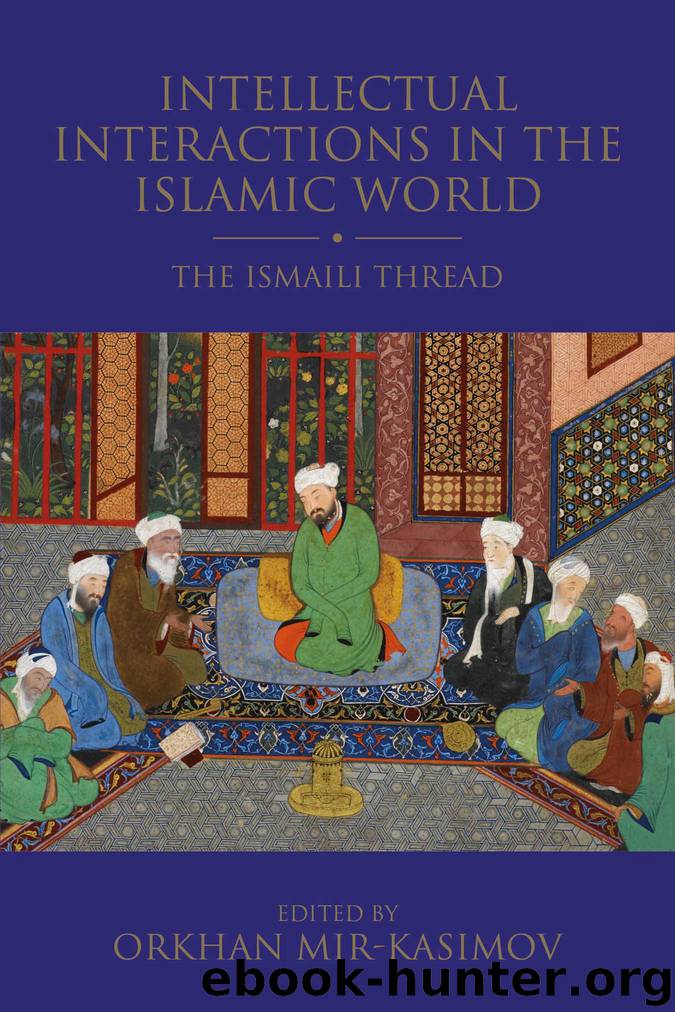Intellectual Interactions in the Islamic World by Orkhan Mir-Kasimov;

Author:Orkhan Mir-Kasimov;
Language: eng
Format: epub
ISBN: 9781838604875
Publisher: Bloomsbury UK
Published: 2019-10-23T16:00:00+00:00
Janis Esots
(The Institute of Ismaili Studies)
The Concept of Nature in Greek Philosophy
‘Nature’ (φύσις) was already an important philosophical concept for the Presocratics, who typically treated it either as the prime matter, or as a process (of genesis), or as the yield/result of such a process.2 Plato used the term extensively3 but the concept of nature is not the central theme of any of his dialogues. In the Philebus, Socrates treated the study of nature as the field of research that investigates the causes of being and becoming (Phil 59a). In the Timaeus, the term ‘nature’ typically refers to the things which are subject to generation and corruption.
Aristotle treated the concept at length in the first four books of his Physics. In broad terms, he equated nature with form.4 He offered several (partially overlapping) definitions, some of which pertain to the universal aspect of nature, and others to the particular one. In the first case, the concept refers to a universal form of becoming.5 In the second, it designates the substance of a natural thing.6
Aristotle’s ideas were further developed by his commentators, in particular Alexander of Aphrodisias and John Philoponus. Like Aristotle, Alexander denied that natural things come to be in reference to an idea (or form, in its Platonic sense) as a model/paradigm.7 Instead, he viewed universal nature as the power or influence which the celestial (supralunar) bodies exert on the sublunar ones (‘the power from the divine [i.e. celestial] bodies8 is the cause of the [difference] between the simple [elemental] bodies and of their coming-to-be, itself coming to be their form and nature’).9 He described this celestial nature as the cause of the unity and order of the world that ‘pervades the whole world and holds its parts together’.10 Elsewhere – in his commentary on the Meteorology IV.7.9–14 – he put it even more explicitly, defining nature as ‘the eternal movement of the divine (i.e., celestial. – J.E.) bodies and the power that comes to be in these sublunary bodies as a result of their proximity to those [celestial ones]’.11 In the aspect and to the extent in which nature aims to produce a certain physical/corporeal form, it can be treated as a manifestation of providence.12
Philoponus, in his commentary on Aristotle’s Physics, describes nature as ‘a life or a power which has descended into bodies and which moulds and manages them’.13 Notably, in his commentary on Physics,14 Philoponus used the term ‘productive nature’ (ή ποιοὐσα φύσις) (which, as Damien Janos justly remarks, may have been the Greek prototype of Abū Bishr Mattā b. Yūnus al-Qunnāʾī’s (d. 328/940) ‘active nature’ (al-ṭabīʿa al-faʿʿāla).15 Philoponus believed that both God and nature create but (according to Simplicius’ account), he underlined the point that nature ‘creates (ποιεῖν) what is generated out of what exists … while God does so out of what does not exist’16 – to put it differently, the creative activity of nature is exercised in the realm of becoming, whereas that of God is exercised in the world of being.
In turn,
Download
This site does not store any files on its server. We only index and link to content provided by other sites. Please contact the content providers to delete copyright contents if any and email us, we'll remove relevant links or contents immediately.
| Hadith | History |
| Law | Mecca |
| Muhammed | Quran |
| Rituals & Practice | Shi'ism |
| Sufism | Sunnism |
| Theology | Women in Islam |
The History of Jihad: From Muhammad to ISIS by Spencer Robert(2212)
Nine Parts of Desire by Geraldine Brooks(2011)
The Turkish Psychedelic Explosion by Daniel Spicer(1993)
The First Muslim The Story of Muhammad by Lesley Hazleton(1887)
The Essential Rumi by Coleman Barks(1635)
The Last Mughal by William Dalrymple(1573)
Trickster Travels: A Sixteenth-Century Muslim Between Worlds by Davis Natalie Zemon(1546)
1453 by Roger Crowley(1492)
by Christianity & Islam(1351)
God by Aslan Reza(1336)
Muhammad: His Life Based on the Earliest Sources by Martin Lings(1296)
A Concise History of Sunnis and Shi'is by John McHugo(1278)
Magic and Divination in Early Islam by Emilie Savage-Smith;(1203)
The Flight of the Intellectuals by Berman Paul(1184)
No God But God by Reza Aslan(1161)
Art of Betrayal by Gordon Corera(1136)
What the Qur'an Meant by Garry Wills(1122)
Getting Jesus Right: How Muslims Get Jesus and Islam Wrong by James A Beverley & Craig A Evans(1081)
The Third Choice: Islam, Dhimmitude and Freedom by Durie Mark & Ye'or Bat & Bat Ye'or(1069)
